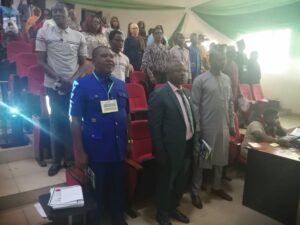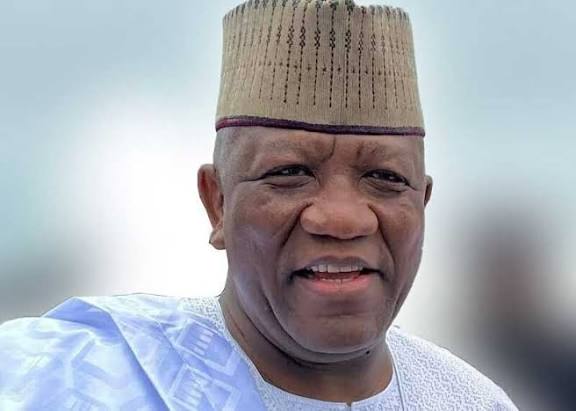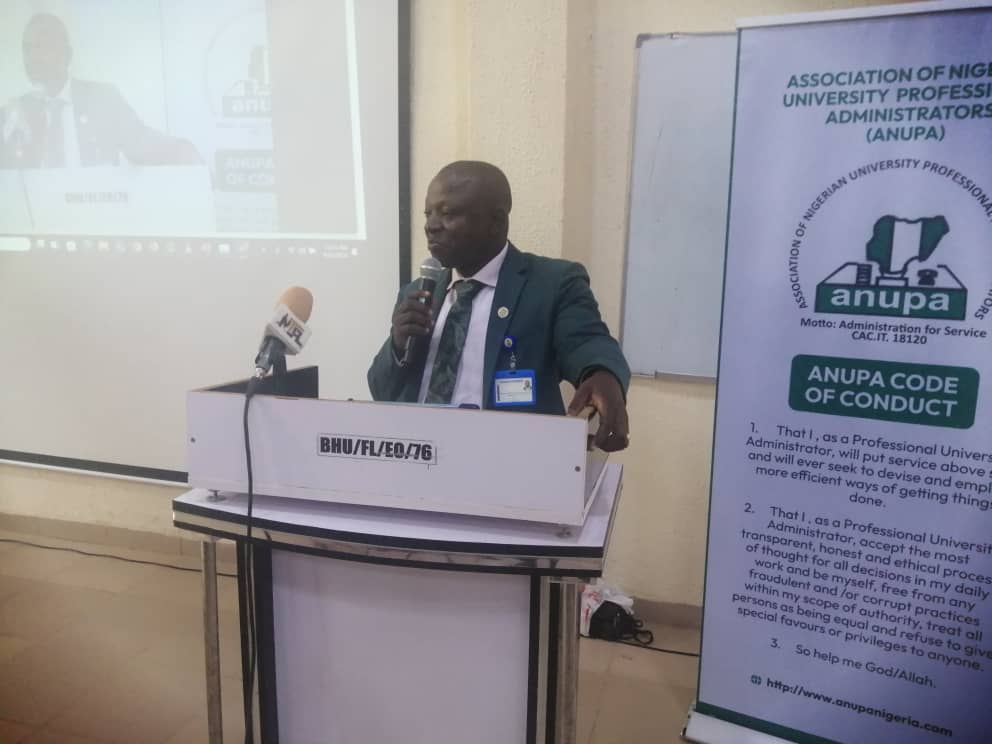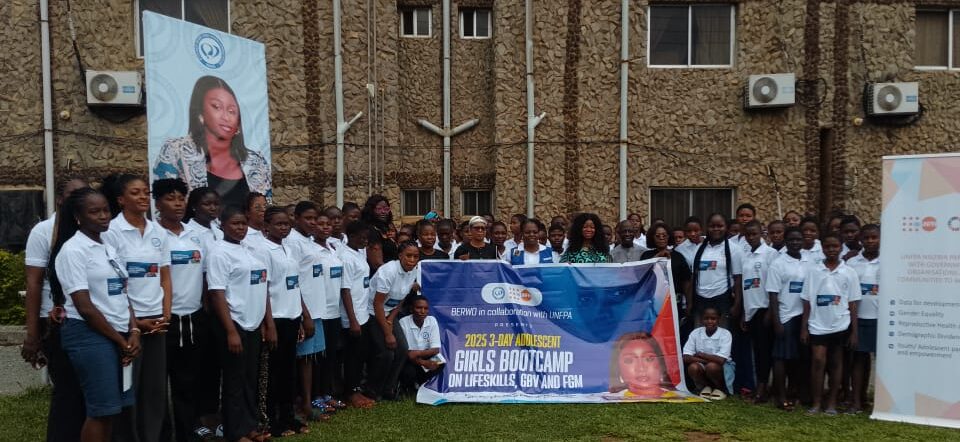By: Goodluck E. Adubazi, Abuja.
As part of efforts to build a more efficient and productive university system in Nigeria, education experts have stressed the urgent need to review outdated university laws that hinder institutional growth. The call was made on the first day of a three-day national training workshop organized by the Association of Nigerian University Professional Administrators (ANUPA), held at Bingham University, Karu, from August 21 to 23, 2025.
With the theme “Effective Administrative Practices for Enhanced Productivity in the University,” the workshop drew participants from junior university administrators across 13 Nigerian universities.

Barr. Hauwa Tamine, Esq., a resource person and Director of the University of Jos Consultancy Services Ltd., led sessions on university laws, regulations, and administrative guides. She highlighted political interference, weak enforcement, cultural pressures, and poor awareness as key challenges facing university administration in Nigeria.
“Obsolete laws threaten the efficiency of our institutions,” Dr. Tamine said. “Broken laws lead to broken futures. Effective administration depends on updated legal frameworks, digital competence, and adherence to governance structures.”
She further cautioned that non-compliance with administrative laws could result in job loss, reputational damage to institutions, and erosion of public trust.
Participants were also trained on the use of digital tools, policy documents, and legal instruments relevant to their roles.
Speaking on communication, Mr. Akin Adeniji, Deputy Registrar, Directorate of Continuing Education Programmes, Ekiti State University, emphasized effective communication as a critical tool for administrative success.
“Proper planning and communication link the university with its students and stakeholders,” Mr. Adeniji said. “You are your work—how you communicate represents the institution.”
He encouraged teamwork, emotional intelligence, and mastery of the “7 Cs of Communication” as fundamental skills for administrators.
Virtual contributions came from Mr. Kenneth Ekemezie, Deputy Registrar, Examinations, Records and Administrative Data Processing (ERA), University of Ibadan, who discussed best practices in record keeping.
“Records are the backbone of university administration,” he said. “They are evidence of institutional decisions, and without them, a university cannot function.”
During the event’s opening session, the Vice Chancellor of Bingham University, Prof. Haruna Kuje Ayuba, expressed appreciation to ANUPA for choosing the institution as this year’s host.
“We are very delighted to host this training workshop. These administrators are the backbone of our universities. We expect efficiency, effectiveness, and a strong sense of responsibility from them to move our institutions forward,” Ayuba said.
He emphasized the need for continuous training and retraining of staff to address challenges such as lax attitudes, lateness, and underperformance among university personnel. According to him, such workshops help “re-engineer staff to do more” and can spark attitudinal changes necessary for a clean, serene, and efficient university environment.
Despite being the host, Ayuba clarified that many of Bingham University’s administrators were unavailable for the workshop due to their involvement in ongoing student screening activities.
Speaking on the significance of the workshop, Dr. Victor Mkuma Bem, National President of ANUPA, described the training as crucial to the progress of Nigeria’s university system.
“Today is significant in the life of universities in Nigeria. The junior category of university staff is foundational, and we’re here to upgrade their skills for better performance,” he stated.
Similarly, Dr. Bem noted that ANUPA organizes annual workshops separately for junior and senior staff, in addition to a general annual meeting for all university professional administrators. He urged members to take advantage of training opportunities in order to remain relevant and responsive in the ever-changing administrative landscape.
Also speaking, Onyinye Ralph-Nwachukwu, National PRO of ANUPA and a Fellow of the Nigerian Institute of Public Relations, praised Bingham University for its hospitality and administrative excellence.
“Since I arrived, I’ve been impressed. The environment is clean, serene, and well-managed. The Vice Chancellor and registrar have been exceptionally cooperative,” she said.
She explained that ANUPA operates as a training arm of the Association of Registrars of Nigerian Universities (ARNU) and is tasked with keeping university administrators updated on current trends, technological advances, and best practices. She added that Bingham University had expressed interest in hosting the event as part of its 20th-anniversary celebrations.
“We expose participants to learning, unlearning, and relearning. Our goal is to ensure that university administrators across federal, state, and private universities are always professionally up-to-date,” Ralph-Nwachukwu said.
She encouraged participants not only to apply what they have learned in their respective institutions but also to share the knowledge and expand their professional networks through collaboration.
The opening day featured participation from several universities, including the University of Ibadan, Bingham University, University of Abuja, Lagos State University, Veritas University, Nnamdi Azikiwe University, Ladoke Akintola University of Technology, Delta State University, and Confluence University of Science and Technology, among others.
Responding to Standard Times Nigeria, participants from various institutions spoke highly of the workshop and its impact on their professional development.
Anthony Chinwuko from Nnamdi Azikiwe University, Awka; Ekemena O. from Dennis Osadebey University, Asaba; Makyo Onje from Nasarawa State University, Keffi; and Mrs. Ndagilaya Yakubu from the University of Maiduguri all expressed gratitude to ANUPA for what they described as a “refining and defining moment.”
They agreed that the skills and insights gained from the workshop would significantly enhance their effectiveness in their respective roles.
The workshop continues through Friday, August 23, 2025, with more sessions focused on enhancing administrative capacity, accountability, and ethical conduct in Nigerian universities.














